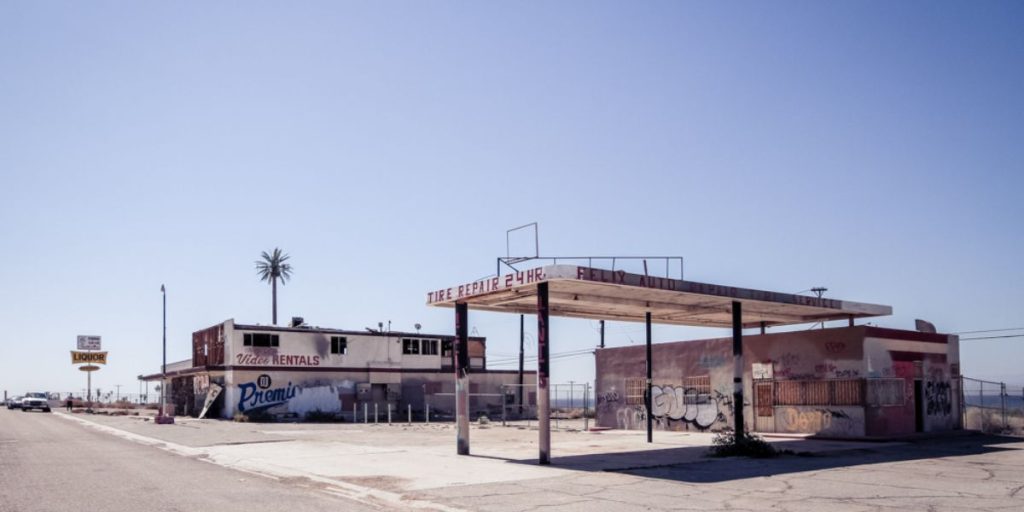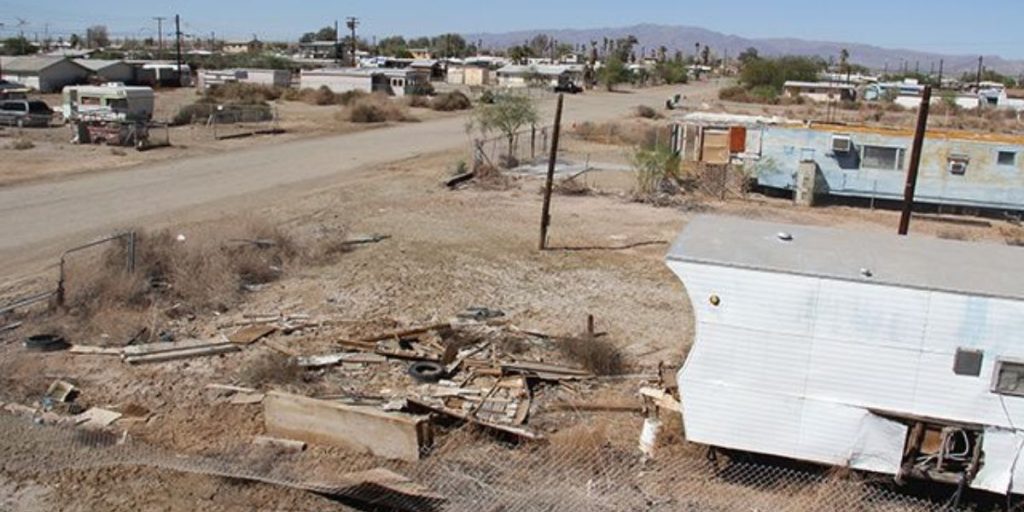Some call Bombay Beach a post-apocalyptic nightmare, a shell of its former self and an ecological disaster zone that once drew film stars and mega-bands. Let’s investigate the ghost town on the banks of California’s Salton Sea, what happened to this once-thriving place, and whether anyone now lives there.
Bombay Beach, Salton Sea’s Ghost Town
Bombay Beach stretches the length of the Salton Sea’s eastern shoreline in the Sonoran Desert in southern California. It is located at the very southern end of the San Andreas Fault, 223 feet below sea level, and bathing in the sunshine. It is the lowest-elevation community in the United States.

Bombay Beach has been a magnificent desert oasis resort since the 1950s, visited by The Beach Boys and Frank Sinatra. Houses, boat ramps, and a yacht club sprouted up along the coastlines to cater to the area’s half-million affluent vacationers, fishermen, and new residents. Plans were developed to build a metropolis with profitable homes and companies nearby.
But all of that came to an abrupt halt in the 1980s.
Also, read: Have You Heard About This Abandoned Ghostly Town in Delaware?
Why is Bombay Beach a ghost town?
The Salton Sea is a lake formed in 1905 when a levee on the Colorado River burst its banks, filling an ancient basin called the Salton Sink. Over the next few years, the desert’s Salton Sea expanded to 400 square miles, fueled by agricultural runoff. This inadvertent act resulted in the creation of the Hoover Dam on the Colorado River.
California’s Department of Fish and Game stocked this freshly formed water source with sport fish, and hundreds of migratory birds arrived to take advantage of the clean water and abundant fish.
However, in the 1970s, agricultural runoff increased the salt content of the water. With no exit and no freshwater inflow, it killed the fish and caused massive algae blooms, killing many of the 400 resident and migratory bird species.
Residents left because the smell of sulfur and dying fish was terrible. There was more to come. In 1976, Hurricane Kathleen devastated southern shoreline businesses and houses. People escaped and did not return, leaving numerous homes to rot on the salty, dead fish-laden coast.
When the occupants left, shops closed, and Bombay Beach quietly but quickly emptied, leaving abandoned houses and furnishings behind, along with petrified fish. The few that remained couldn’t afford to go.
Read More: Explore the Ghostly Abandoned Town in Utah
Bombay Beach Today

The Salton Sea is filled with toxic chemicals, and the evaporating waters stink. It is no longer a tourist destination, and its remains are home to less than 230 people, mostly elderly. Few people take the time to visit. Bombay Beach is occasionally used by filmmakers to depict a post-apocalyptic dead zone, and photographers capture bleak views. Perhaps the most recent use of Bombay Beach is in Grand Theft Auto V, where the ghost town inspired Sandy Shores and the dubious Trevor’s location.
However, during the last few years, artists have begun to fill the places that were formerly crowded with tourists and homeowners. Where homes and boats formerly stood, there are now numerous large-scale artworks and art installations. In 2015, artists established the annual Bombay Beach Biennale. This show transforms abandoned homes into large-scale art displays.
So, is Bombay Beach in California’s Salton Sea a ghost town? Some describe it as a living ghost town. In truth, the sea has been poisoned. It’s an ecological disaster zone that scientists believe will only sustain microorganisms in the future years, but the beaches draw eccentric people looking to express their creative side.